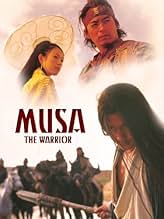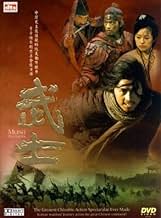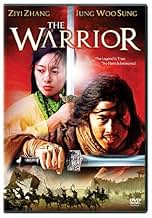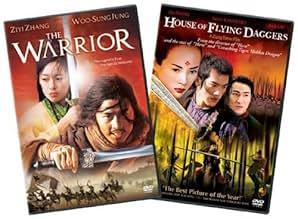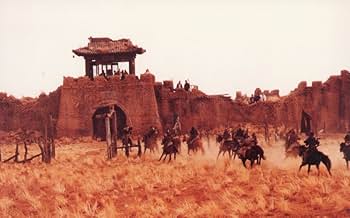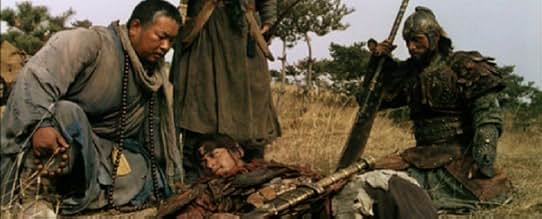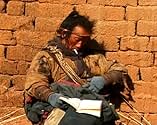Na China de 1937, em meio às disputas ferozes entre as dinastias Yuan e Ming, um grupo de emissários coreanos enviados para negociar com o governo descobre que uma princesa foi sequestrada e... Ler tudoNa China de 1937, em meio às disputas ferozes entre as dinastias Yuan e Ming, um grupo de emissários coreanos enviados para negociar com o governo descobre que uma princesa foi sequestrada e decide organizar um resgate.Na China de 1937, em meio às disputas ferozes entre as dinastias Yuan e Ming, um grupo de emissários coreanos enviados para negociar com o governo descobre que uma princesa foi sequestrada e decide organizar um resgate.
- Direção
- Roteirista
- Artistas
- Prêmios
- 6 vitórias e 11 indicações no total
- Princess Bu-yong
- (as Zhang Ziyi)
- Ga-nam
- (as Park Jung-hak)
- Yongho Soldier
- (as Mi-Nam Jung)
Avaliações em destaque
MUSA or THE PRINCESS WARRIOR is probably in between. Because this war and almost everything that happens here is related to an unfinished love story between three characters (if you think is stupid, remember Homer's ILIADA and the reason of the Trojan War).
About seven centuries ago, Chinese got divided and a diplomatic mission from the Koryo kingdom (protected by small group of soldiers), try to make peace with the Ming dynasty. The Ming's army refuses to accept the ambassadors and escort the whole group out of the country. In the dessert, Mongolian's forces attack and kill the Ming's soldiers releasing the Koryo people in the dessert.
An ambitious, very tough (and young) Koryo general, tries to lead his people back to his country, until they found a Mongolian group carrying a Ming's princess prisoner. Engaged by the woman's beauty, he decides to rescue her, justifying his actions as a political opportunity.
Meanwhile, an ex-slave (released by the noble Ambassador before dying in the dessert), itself a great but silent warrior, gets involved in the rescue and after showing his courage and ability in combat, is forced to protect the Princess, creating obvious jealousy on the young general.
Mongolian's of course, will not accept being defeated, so they run after the small group, to recover the princess.
What happens after (the movie is more than two and a half hours long but never boring) is somehow predictably; however this is a Korean movie, so do not expect the silly and forced happy ending. What make the movie worth (a 10 / 10) is the way things are told, the beauty of the images and the poetry surrounding the story.
This movie war movie, but is not glorifying war, but the honor of people fighting for their countries. This is a love story, but a real one, were words are unnecessary and everything that happens is inside every character, but just looking at their eyes, we know what exactly are their feelings.
Halfway through the film, we realize that the line between bad and good guys is not really clear. That the real enemy is sometimes on the same side.
There are a lot of small characters, and everyone gets enough screen time, to make us care about them; sometimes even more than the main characters.
A special mention deserves the numerous war scenes. Using a slow motion, first person shots, quick editing and almost every camera trick you could imagine, you will feel in the middle of the battlefield (and a very scary one ). The blood and violence are much more realistic, than BLACK HAWK DOWN or WHEN WE WERE SOLDIERS, and the impression created is more than those two plus any other recent war related.
In brief; as far as I know this movie did not get a cinema release, but you can find it in EBAY or in some special video stores. DO NOT MISS IT; is probably the best movie of the year.
This is an epic film, shoot over 9000 miles of China's northern region. Covering plains, prairies, forests, deserts and coastline. The cinematography is beautiful.
Though this is a Korean film, it utilizes the famous Chinese actress Zhang Ziyi, who portrays a kidnapped daughter of the Chinese Emperor.
Throughout most of the film the Korean warriors speak Korean. The Princess and the Chinese villagers speak Mandarin. Interestingly the Mongols also speak Mandarin to each other, historically inaccurate but Mongols don't go to movies these days. Some of the Koreans can also speak Mandarin. This is accurate since the educated Koreans of the time, could read, write and speak Chinese. This film is subtitled in English.
This is a grand story of honor, sacrifice and overcoming overwhelming odds. The Korean warriors must fight the larger forces of the Mongols. Using tactics and strategies not unlike that which you can find in Sun Tzu's the Art of War writings.
If you want some insight into the culture and attitudes of the people of this region, Musa is the movie for you.
The movie begins in 1375 with a failed delegation from Korea to the Ming dynasty. Led by General Choi Jung (Jin-mo Ju), the delegation become prisoners of the Ming, being led off to exile, when the Mongols strike. Suddenly finding themselves free, the delegation decides to rescue the captive Ming princess (Ziyi Zhang, of Crouching Tiger fame) who travels with the Mongols. When they succeed, naturally, the Mongols want her back, and thus begins an arduous trek across the desert, culminating in a Road Warrior-esque fight at a battered old castle where the survivors hole up against their much more mobile but less-civilized attackers.
Musa has action in spades, some of it exceptionally grisly (every archery attack is cause for dozens of shots of gruesome impalings). The battles are tense and tautly filmed and feel more dangerous than most combats of this type. We eschew the beautiful martial arts style so prevalent in many Hong Kong films for a grittier and far more realistic, if a bit bloody, style here. But what Musa also possesses is atmosphere; the locations and the cinematography are top-notch, from the boundless deserts to the broken-down castle by the sea. Musa does an excellent job of selling the world it is set in.
The costumes help with this as well. Not since Brotherhood of the Wolf have I seen such elaborate and effective costuming (the armor and such here was even more intricate and character-intensive than Last Samurai, which is saying something). Each character has his own particular look, is easily told apart from the others, and costuming is ultimately an extension of character, which to me has always been the whole point. These are some of the best period costumes you'll see anywhere.
The acting is all pretty good, though it tends to come from the George Lucas school of `faster, more intense.' One facet I did like is that no one is perfect; the general is a bit of a jerk; his loyal retainer Ga-nam (Jeong-Hak Park), while a mighty warrior, lacks the ability to really think for himself; the princess is spoiled; the slave-turned-warrior Yeo-sol (Woo-sung Jung) is selfless but headstrong, and so on. Even the Mongols come across as human, if a bit savage (which, having done the research, I can attest is more or less pretty accurate).
Musa isn't for everyone due to the violence. But it's a very well done period piece with wonderful visuals that certainly captivates the viewer. It's as good or better than any of the historical epics Hollywood has released in the past few years (with the exception of The Last Samurai), and from a costuming and cinematography sense is very much worth your while to see. Just don't bother tracking this down if you're a little squeamish, that's all.
My Grade: A
Region 0 DVD Extras: nothing and it's the 132 minute international cut. I love this film, but try your best to seek out the R2 Scandinavia 3-Disc SE, as it has the longer 155 minute version AND the international cut AND a great deal of extras
1)The tempermental and rebellious "hero" who has a serious self control problem gets the entire ancient Korean Caravan in trouble with his psychotic propensity towards violence. The Caravan saves themselves and the hero with cunning and wit. 2)The "hero" puts the entire Caravan in jeopardy again by cutting off the head of one of the merchants. This time many Caravan members die but they still escape relatively intact. 3)The Caravan finds a way to escape from their dire situation but the "hero" puts an end to their salvation by doing something totally stupid and irrational. Again, the great leadership, solidarity, and fighting ability of the Caravan saves them from disaster.
By this time, I began to beg someone to have the senses to kill the "hero" who was getting everyone else killed with his irresponsible actions. Instead of languishing in frustration, I decided to use my remote control.
The "hero" is played by Jung Woo Sung, one of the worst, and yet one of the most popular, actors in Korea. The only characters he usually plays are the silent rebellious types who act angry all the time, probably to hide his lack of acting ability.
This was the most expensive movie made in Korea (few films have surpassed it since). Yet it was a box office bomb, and with a good reason.
Você sabia?
- CuriosidadesDuring filming in China, Woo-sung Jung got knee-injury while shooting one of his fight scenes and had to stay behind after the Korean crew came back to Korea.
- Citações
Princess Bu-yong: You could have killed me! I am a Princess!
Yeo-sol: Stop yelling at me! Don't think you can do anything you like just because you are a Princess!
Princess Bu-yong: Unhand me!
[English translation subtitles from Mandarin Chinese in Korean language film]
- Versões alternativasInternational version runs ca. 25 minutes shorter.
- ConexõesReferenced in Para Sempre (2012)
Principais escolhas
Detalhes
- Data de lançamento
- Países de origem
- Idiomas
- Também conhecido como
- The Warrior
- Locações de filme
- Empresas de produção
- Consulte mais créditos da empresa na IMDbPro
Bilheteria
- Orçamento
- BND 8.000.000 (estimativa)
- Faturamento bruto mundial
- US$ 945.922
- Tempo de duração
- 2 h 38 min(158 min)
- Cor
- Mixagem de som
- Proporção
- 2.35 : 1





